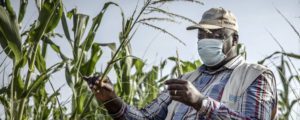FAO calls for joint coordinated global response to support food and agriculture
FAO unveiled its new comprehensive COVID-19 Response and Recovery Programme, aimed at preventing a global food emergency during and after the COVID-19 pandemic while working on medium to long-term development response for food security and nutrition. The agency is calling for USD1.2 billion in initial…
 FAO unveiled its new comprehensive COVID-19 Response and Recovery Programme, aimed at preventing a global food emergency during and after the COVID-19 pandemic while working on medium to long-term development response for food security and nutrition. The agency is calling for USD1.2 billion in initial investment to support the needs of the new programme.
FAO unveiled its new comprehensive COVID-19 Response and Recovery Programme, aimed at preventing a global food emergency during and after the COVID-19 pandemic while working on medium to long-term development response for food security and nutrition. The agency is calling for USD1.2 billion in initial investment to support the needs of the new programme.
FAO’s new programme aims to mitigate the immediate impacts of the COVID-19 pandemic while strengthening the longer-term resilience of food systems and livelihoods.
In line with the UN approach to “build back better” post COVID-19, and in pursuit of the Sustainable Development Goals (SDGs), the new programme aims to mitigate the immediate impacts of the pandemic while strengthening the longer-term resilience of food systems and livelihoods.
Addressing COVID-19 impacts on food systems
Besides being a major public concern, the COVID-19 pandemic can also be a serious threat to global food security. According to the World Bank’s estimates, the pandemic’s economic impact could push about 100 million people into extreme poverty. Soaring unemployment rates, income losses and rising food costs are jeopardizing food access in developed and developing countries alike and will have long-term effects on food security.
According to the latest edition of FAO’s report on the State of Food Security and Nutrition in the World, even before the impacts of the COVID-19 pandemic hit the global food systems and livelihoods of millions of people at the start of the year, 10 million more people were in a condition of undernourishment with respect to 2018 and 60 million more with respect to 2014. The Global Report on Food Crises 2020 estimates that 135 million people were acutely food-insecure in need of urgent humanitarian food and nutrition assistance.
Furthermore, the pandemic may plunge national economies into recession, and countries ought to take urgent measures to mitigate the longer-term impacts on food systems and food security.
Equally urgent is the compounding threat of the pandemic on existing crises – such as conflict, natural disasters, climate change, pests and plagues – that are already stressing our food systems and triggering food insecurity around the globe.
🆕 @FAO unveiled its comprehensive #COVID19 Response & Recovery Programme, aimed at preventing a global food emergency during & after the pandemic.
$1.2 billion in initial investment needed to support the new programme.
➡️https://t.co/n3kaPN0EnK pic.twitter.com/67zkrpWotR
— FAO Newsroom (@FAOnews) July 14, 2020
The programme’s seven key priority response areas
To minimise COVID-19’s damaging effects on food security and nutrition while transforming global food systems to make them more resilient, sustainable and equitable, FAO calls for immediate action in seven key priority areas:
- Reinforce a Global Humanitarian Response Plan for COVID-19
- Improve Data for Decision-making
- Ensure Economic Inclusion and Social Protection to Reduce Poverty
- Bolster Trade and Food Safety Standards
- Boost Smallholder Resilience for Recovery
- Prevent the Next Zoonotic Pandemic through a strengthened One Health Approach
- Trigger Food Systems Transformation
In response to the current emergency, FAO is working on convening governments and multiple stakeholders in a call to action, gathering and analyzing data to better understand emerging trends and pinpoint any deterioration, and providing prompt technical advice and capacity development across a wide range of disciplines. In addition, the Organization is offering investment support to leverage all forms of partnerships and finance.
The new programme is also supported by the COVID -19 Food Coalition, launched by the Government of Italy and led by FAO mobilizing political, financial and technical assistance in support of countries affected by the current crisis.
More information
• FAO launches the new COVID-19 Response and Recovery Programme outlining seven key priority areas – FAO Website
• FAO COVID-19 Response and Recovery Programme – FAO Website